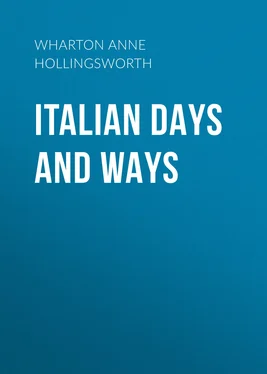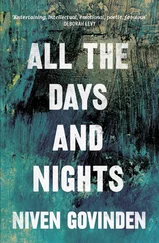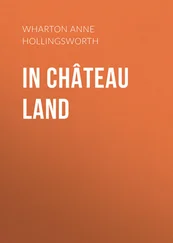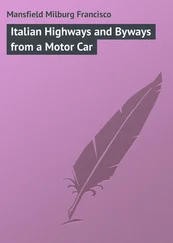Anne Wharton - Italian Days and Ways
Здесь есть возможность читать онлайн «Anne Wharton - Italian Days and Ways» — ознакомительный отрывок электронной книги совершенно бесплатно, а после прочтения отрывка купить полную версию. В некоторых случаях можно слушать аудио, скачать через торрент в формате fb2 и присутствует краткое содержание. Жанр: Путешествия и география, foreign_antique, foreign_prose, на английском языке. Описание произведения, (предисловие) а так же отзывы посетителей доступны на портале библиотеки ЛибКат.
- Название:Italian Days and Ways
- Автор:
- Жанр:
- Год:неизвестен
- ISBN:нет данных
- Рейтинг книги:4 / 5. Голосов: 1
-
Избранное:Добавить в избранное
- Отзывы:
-
Ваша оценка:
- 80
- 1
- 2
- 3
- 4
- 5
Italian Days and Ways: краткое содержание, описание и аннотация
Предлагаем к чтению аннотацию, описание, краткое содержание или предисловие (зависит от того, что написал сам автор книги «Italian Days and Ways»). Если вы не нашли необходимую информацию о книге — напишите в комментариях, мы постараемся отыскать её.
Italian Days and Ways — читать онлайн ознакомительный отрывок
Ниже представлен текст книги, разбитый по страницам. Система сохранения места последней прочитанной страницы, позволяет с удобством читать онлайн бесплатно книгу «Italian Days and Ways», без необходимости каждый раз заново искать на чём Вы остановились. Поставьте закладку, и сможете в любой момент перейти на страницу, на которой закончили чтение.
Интервал:
Закладка:
On Sunday afternoon Roger and Phœbe drove me up to the little sanctuary of the Madonna della Guardia. Our road crossed that leading to Bussana Vecchia, which picturesque ruin attracts me by its mystery and its remoteness from the life of to-day. If you were here you would certainly explore the remains of this old town, and perhaps you would take me with you through its silent streets. Just now fate seems to be against my seeing it. On Saturday, when we were all ready to set forth, the rain fell in torrents, and on Sunday there was no time to stop on our way to Capo Verde, so Bussana Vecchia seems destined to be my "Carcassonne."
The little sanctuary of the Madonna della Guardia is built, like the home of the wise man of the Scriptures, upon a rock, crowning the promontory of Capo Verde. From the heights there is a fine panorama, as they say here, of sea and shore; Taggia and Poggio were at our feet as we stood on the shelving rock, which overhangs a sheer declivity of many feet. In the church there is a collection of curious pictures, votive offerings, representing men and women in the midst of deadly peril by field and flood: fishermen in boats tossing upon stormy seas, and carriage-loads of pleasure-seekers pitching down precipices or dashing along the road at the mercy of steeds as wild as that of Mazeppa. All of these good people, as appears from the expressions of gratitude recorded in the several paintings, were saved from sudden and horrible death by the powerful intervention of the gentle Mother of Sorrows and Mercies.
I am finishing this letter while Genevra sings to the children their good-night songs and tucks them into their beds. To-morrow will be a full day, with some commissions to be attended to at the shops, which are tempting here, two or three visits, and an afternoon tea with some charming Scotch ladies at the Hôtel de Londres. The day following I leave here for Nice, having decided to meet Zelphine and Angela there instead of at Genoa as I had intended. This change of plan is made in order that we may take the famous drive from Nice to Genoa, which Dr. A. assures me is not as dangerous as it appears, and in beauty more nearly approaches the description of Paradise than anything else to be seen upon earthly shores. If we make the trip in an automobile, which we shall probably do, we shall have a couple of hours to spend here with Genevra en route for Genoa, which anticipation helps to console her for her disappointment in losing two days of my visit. She will then be able to judge for herself whether Angela is as pretty as I have described her and whether Zelphine is as charming with white hair as with brown, questions that may seem of little moment to the masculine mind, but are deeply interesting to Genevra. She will be calling me soon to join her at what Macaulay calls "the curling hour," which we count the best in the twenty-four. Lucie heaps up the olive-wood on the hearth until it blazes brightly, and places a tray with chocolate before us. Thus cheered and sustained we gossip into "the wee, sma' hours." Genevra asks so many questions about her old friends that we should have to talk until the cocks crow if I were to answer them all. By the way, do your ears ever burn these nights about twelve o' the clock? She often talks of you, asks if you have grown more sedate with added years and dignities, whether you have lost your habit of jesting, and speaks of a certain merry twinkle in the corner of your eye which used to betray you when mischief was brewing—on the whole Genevra cherishes a very cousinly affection for your lordship. There! she is calling me, so
"Good-night!—if the longitude please,—
For, maybe, while wasting my taper,
Your sun's climbing over the trees."
III
CAPTURED BY A CABMAN
If Lady Morgan wrote of her beloved Irish capital "dear, dirty Dublin," we may describe Naples less alliteratively in somewhat the same words, except that to American eyes the Neapolitan city is even dirtier and vastly more beautiful. Indeed, no words written nor pictures painted give any adequate conception of the blueness of the sea, the soft purple shades upon the mountains, and the fine transparency and lightness of this air. One breathes in gayety with every breath, a certain elasticity and joie de vivre which the filth, the noise, the bad odors, and even the hopeless poverty all around us are powerless to dispel.
From the Strada Vittorio Emanuele, where we are stopping, we look down upon a series of terraced gardens, some of them very poor little gardens with a few vegetables, among them the omnipresent and much beloved artichoke, the fennel, like a coarse celery, and lettuce. Roses are climbing all over the walls of these hillside gardens, and in many of them orange-trees are blooming, spreading around them a delicious perfume. Here on the heights we have none of the disadvantages of Naples, the noise, the unsavory odors, or the uncleanliness.
Above this strada , which is the name by which the Neapolitans call their streets, the hills tower for many feet, and way up on their crests are the Castle of St. Elmo and the old Carthusian monastery of San Martino. We visited San Martino the day after our arrival, because Zelphine had an irrepressible desire to get to the tip-top of everything and view both the city and bay from the heights above us. The ascent was made in one of the funicolari , cable trams, which are used so much over here. They are rather terrifying at first, but are said to be quite safe, and are, I believe, less dangerous than many of our elevators.
The old monastery is now a museum, under the management of the Museo Nazionale, and contains many paintings, porcelains, carvings, and other antiques. We neglected the treasures within for the greater pleasure of wandering at will through the charming, picturesque cloisters, which are richly carved and of a stone warm and creamy in tone, so different from the heavy, dark cloisters one sees in England and elsewhere. Most of our morning was spent basking in the sunshine of the court; we could fancy the old monks enjoying, as we did, the genial warmth that in the Southern Italian winter is only to be found out of doors. The museum itself was damp, as are all the galleries at this season.
In this court are a number of handsome sarcophagi, with inscriptions and coats-of-arms carved in the marble; from hence we passed into the Belvedere, whose balconies command an exquisite view of the city and bay. We gazed long at the noble panorama spread before us, from Posilipo to the hill of Capodimonte. Over across the bay were Ischia and Capri, blue as its own grotto, with Sorrento's long point of land reaching out into the sea, and off in the far distance the snow-line of the Apennines. To our left, Vesuvius, with its three peaks, was smoking away as peacefully as a Hollander on his hooge stoep . Seeing them by day it is hard to believe that these fair blue hills could have wrought sudden destruction upon the cities of the plain; but last night, when flames flashed up skyward from the smoking crater, I must confess that we had some misgivings. When we beheld these danger-signals, as they seemed to us, we carried our fears and our queries to the padrone and the concierge, who both assured us, to their own satisfaction if not entirely to ours, that Vesuvius has never erupted in the direction of Naples, evidently feeling that Italian volcanoes, like Italian people, are not in the habit of changing their ways.
Standing upon the Belvedere of San Martino, we were able to form some idea of the great width of the bay, where just now "William's yacht," as one of our English friends always calls it, is riding at anchor. The Kaiser is making one of his rapid, semi-official, quite friendly, and wholly diplomatic visits to Rome, and his yacht awaits him here.
Читать дальшеИнтервал:
Закладка:
Похожие книги на «Italian Days and Ways»
Представляем Вашему вниманию похожие книги на «Italian Days and Ways» списком для выбора. Мы отобрали схожую по названию и смыслу литературу в надежде предоставить читателям больше вариантов отыскать новые, интересные, ещё непрочитанные произведения.
Обсуждение, отзывы о книге «Italian Days and Ways» и просто собственные мнения читателей. Оставьте ваши комментарии, напишите, что Вы думаете о произведении, его смысле или главных героях. Укажите что конкретно понравилось, а что нет, и почему Вы так считаете.












